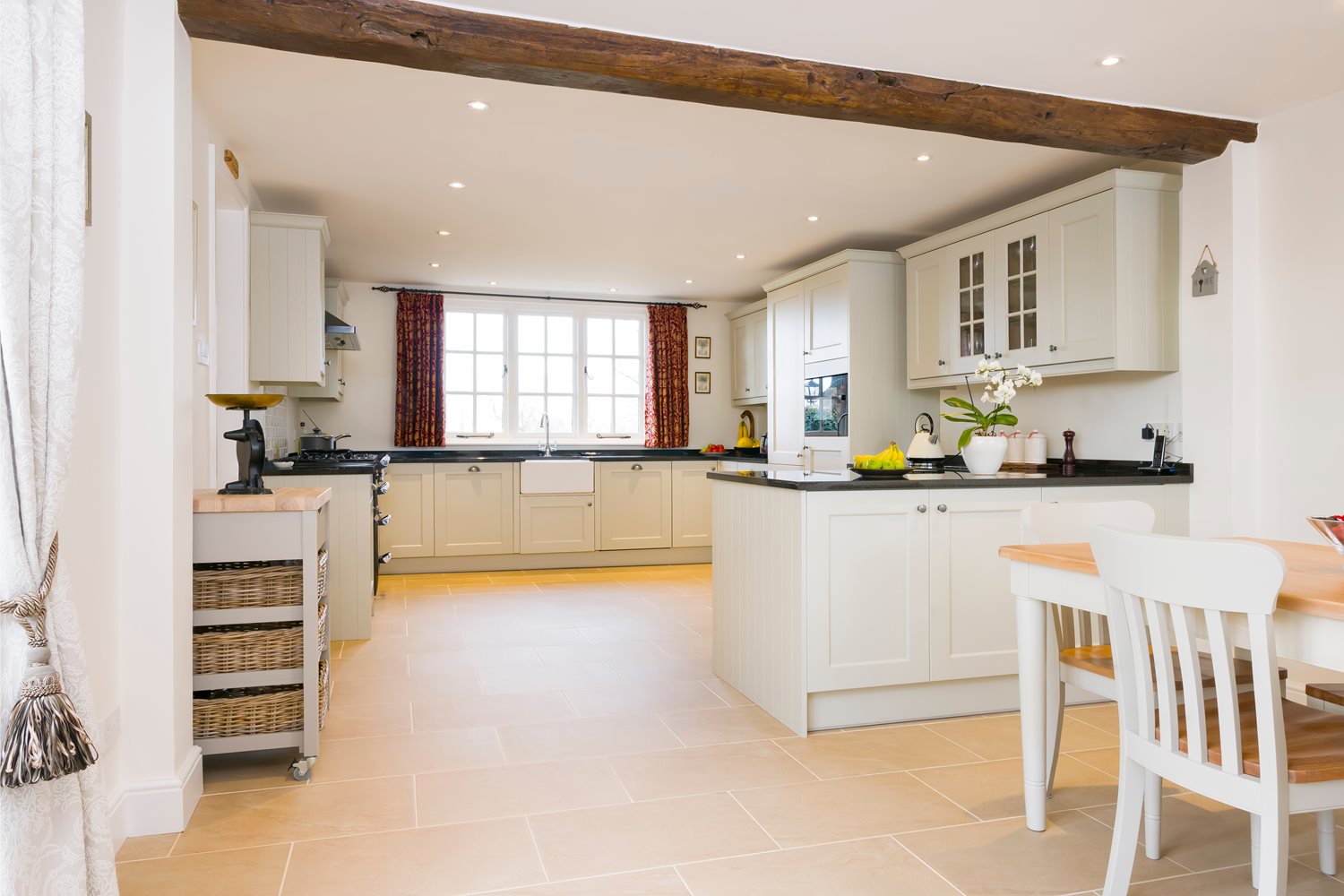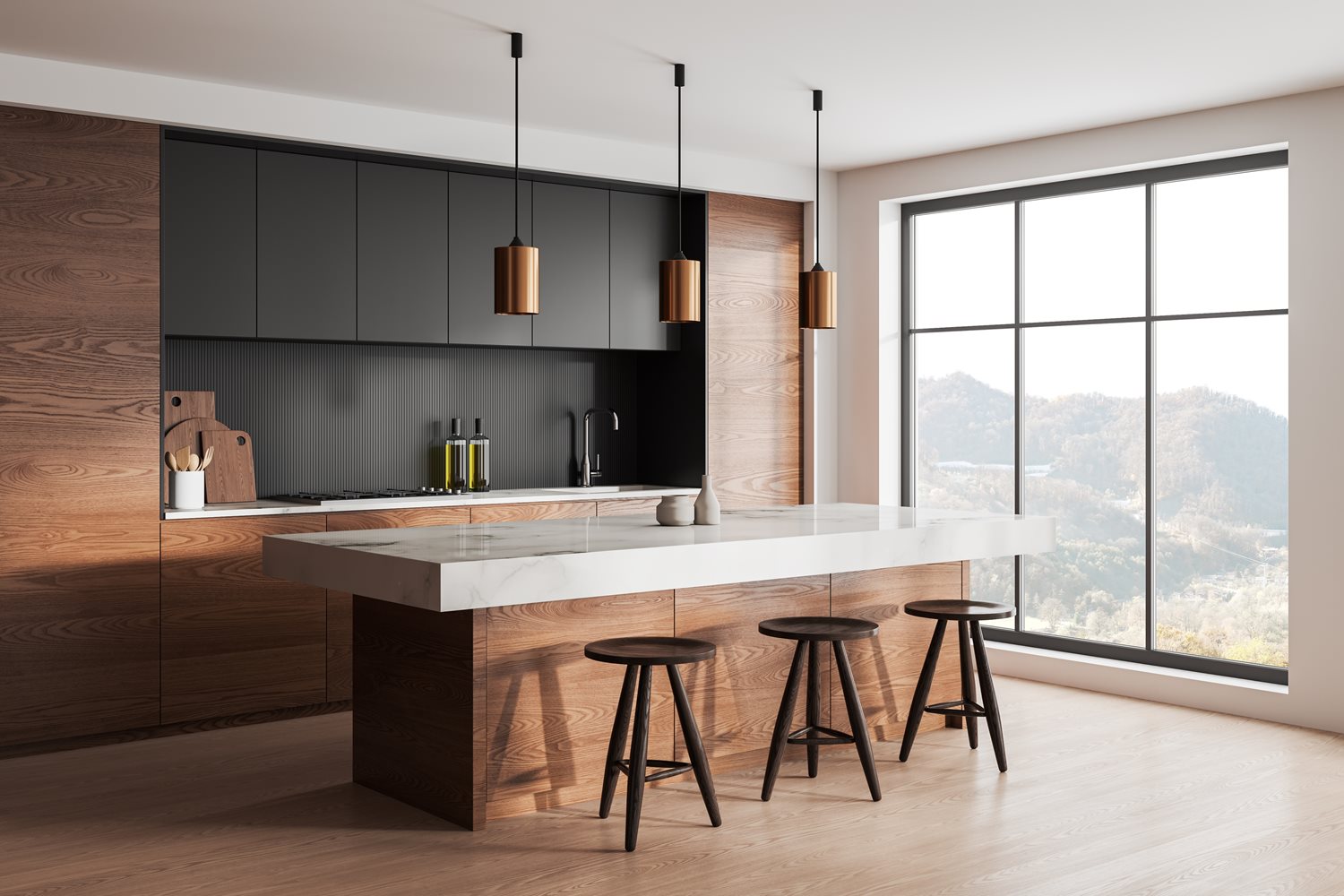The kitchen is often referred to as the heart of the home, but it can also be one of the most dangerous rooms in a house, and a high-risk area for electrical hazards.
In fact, according to the London Fire Brigade, 60% of UK house fires start in the kitchen.
Whether you’re looking to renovate your kitchen or make some minor adjustments to your cooking space, this guide will tell you everything you need to know about electrical regulations and safety in the kitchen.
General electrical safety in the kitchen

With its potent mix of electricity, water, heat, and flammable substances like cooking oil, kitchens are full of potential hazards.
And the main culprit? Cooking appliances, which accounted for 44% of all accidental house fires in the year ending March 2024.
That’s why it’s so important to take steps to protect your home and family against the risk of electric shocks, fires, and burns in the kitchen.
Cooking can be an enjoyable hobby and a great way to connect with family. We just need to take some sensible precautions to ensure we’re using cooking appliances safely.
- Unplug appliances when not in use and before cleaning.
- Never touch anything electrical with wet hands.
- Keep flammable objects, such as tea towels and oven mitts, away from cooking appliances.
- Avoid the use of multiple high-wattage (power) appliances simultaneously on the same electrical circuit.
- Never store anything on top of a microwave.
- Clean cookers and grills regularly to avoid fat and grease buildup.
- Turn cooking appliances off when you’re finished using them.
- Ensure you have a working heat detector to sound the alarm if a fire does break out.
How do I know if my kitchen electrics are safe?
It’s not always possible to see when an electrical fault has developed in an installation or appliance. That’s why it’s important to get your kitchen electrics checked over by a registered electrician – especially if your kitchen has been installed for a while or you’re noticing other ‘red flags’.
If any of the following are true, it’s probably time to get a registered electrician in to test and inspect your kitchen installations and appliances.
- It’s been 10+ years since your kitchen electrics were last checked.
- Your appliances are repeatedly tripping your fuses/circuit breakers or other electrical protective devices.
- Your lights are flickering, even after you’ve changed the bulbs.
There are two types of tests a registered electrician can carry out in your kitchen: an Electrical Installation Condition Report (EICR) and in-service inspection and testing.
Electrical Installation Condition Reports (EICR)
An EICR is a specialised report produced by a registered electrician who is certified to carry out this type of work, after they have thoroughly inspected and tested your home’s electrical installation.
An electrical installation brings electricity from the main supply into your house, making it usable. This includes wires and cabling, consumer units or fuse boxes, light switches, socket-outlets, circuit breakers, and RCDs (residual current devices).
An EICR will identify issues with your home’s electrics and (if applicable) recommend remedial work to make your home (and therefore your kitchen) safer. Think of it like an MOT for your home’s electrics.
Although there’s no legal requirement to carry out electrical safety checks in privately owned properties, NICEIC recommends having an EICR carried out in your home at least every 10 years.
In-service inspection and testing of electrical equipment
Formerly known as PAT testing, the in-service inspection and testing of electrical equipment is a health check of the electrical appliances in your property and should also be carried out by a registered electrician. An electrical appliance is a device that is either plugged or hard-wired into the mains electricity in your home, such as kettles, toasters, fridges, ovens, and microwaves.
In-service testing and inspection is more commonly used by businesses or landlords to ensure the appliances they’ve provided their employees or tenants are safe to use.
Considerations when installing electricity in your kitchen

New electrical installations in the home (as well as major alterations to existing electrical circuits) fall under Part P of the Building Regulations in England and Wales. Electrical work that falls under Part P – also known as notifiable work – must either:
- be approved by your Local Authority Building Control
- be certified by a professional registered on a third-party certification scheme
- be carried out by a professional registered on a competent person scheme (CPS) such as NICEIC’s, who can self-certify their work meets regulatory requirements.
The safest, easiest, and least expensive option is to choose a CPS-registered electrician to undertake the work. They are subject to regular assessments to ensure they are continuing to adhere to all the latest regulations and standards, and that they’re delivering safe, high-quality installations. You can easily find a local electrician certified on NICEIC’s CPS scheme using our Find a trusted tradesperson tool.
Once they’ve notified the installation to Building Control, your electrician will provide you with a copy of the Building Regulations compliance certificate, which you can keep for your records.
A similar system exists in Scotland, with Scottish homeowners required to obtain a building warrant for most types of electrical work under the Scottish Building Standard regulations. This is unless the work is carried out by an Approved Certifier of Construction (who can self-certify their work meets the required standards). At present, Northern Ireland has no equivalent statutory requirement.
Installing electrics in your kitchen

Whether you’re designing your kitchen from scratch or making alterations, there are some rules and recommendations you should be aware of when installing electrics in this location.
Socket-outlets - it’s recommended that socket-outlets are placed at least 30cm horizontally away from sinks and at least 10cm from hobs, to prevent risks like splashing water and accidental contact with hot surfaces.
Ideally, they should also be placed 10cm above your kitchen countertops to avoid damage to flexible cables.
All socket-outlets in kitchens must be protected by a residual current device (RCD), which will immediately cut off the electricity supply if a fault is detected.
Hob switches - your main cooker isolator switch should also be at least 10cm horizontally away from your hob or oven, and not positioned directly above or behind it. This is so you can turn it off in an emergency without burning yourself or risking a fire.
Kitchen ventilation - part F of the Building Regulations (England and Wales) stipulates that kitchens need to have adequate ventilation – either manual or natural.
Kitchens with windows aren’t required to have an extractor fan (although it’s still recommended to remove water vapour and air pollutants from your kitchen). However, kitchens without windows must have an extractor fan or cooker hood vented to the outside of your home.
Meanwhile, the Scottish Building Standards Technical Handbook recommends either:
- intermittent extractor fans in kitchens capable of at least 30 litres per second if installed over a hob, or at least 60 litres per second if installed elsewhere; or
- a passive stack ventilation (PSV) system.
In Northern Ireland, technical booklet K stipulates that all kitchens must have an intermittent or continuous extractor fan, and lists the minimum extraction rates for each.
Kitchen wiring regulations
There are a few things to be aware of in relation to kitchen wiring. Firstly, some appliances – like your electric hob – should have their own circuit to prevent overloading, ensure safe operation, and minimise the risk of electrical fires. Your lighting should also be installed on a separate circuit, so you’re not plunged into darkness if an appliance trips a circuit breaker!
Secondly, cables installed near an oven or hob should be heat resistant, ensuring they maintain their integrity at higher temperatures.
Your electrician will be able to further advise you on the wiring regulations that are relevant for your kitchen.
Finding a trusted professional for your kitchen installation
With the combination of electricity, water, and heat giving rise to multiple potential hazards, your kitchen is definitely not a location where you want to be doing DIY electrical work (nor is anywhere else in your home, for that matter)!
Instead, you can use NICEIC’s Find a Trusted Tradesperson tool to submit your kitchen electrical job to local NICEIC-registered professionals with the right skills and experience for the job. Simply give us some details about your job, some contact information, and select the businesses you want to approach for a quote.
NICEIC-registered electrical businesses are regularly assessed to ensure they are complying with all the latest standards and regulations, and that they have the knowledge, skills, and qualifications they need to deliver quality installations that will keep your home and family safe.
To check whether a business is on our register, you can search their trading title on our Find a Trusted Tradesperson tool or check with our Customer Services team by calling 0333 015 6625.
Nonetheless, as a higher-risk environment where water, extreme heat and electricity have the potential to mix, there are certain rules and regulations that registered electricians follow to create the safest possible environment in your kitchen, including:
- appropriate positioning of socket-outlets and isolation switches
- adequate means of isolation for large appliances
- adequate ventilation for electrical equipment
- residual current device (RCD) protection for all socket-outlets, cables buried in walls, and lighting circuits.
If you’re getting a gas hob or any other gas appliance installed, don’t forget that you must by law get this work carried out by an engineer on the Gas Safe Register.
Some kitchen electrical work in England and Wales falls under Part P of the Building Regulations (also known as ‘notifiable’ work). This means it must be notified to your Local Authority Building Control for inspection and approval or, alternatively, carried out by an electrician registered with a competent person scheme like NICEIC’s. The latter option is often cheaper and less time-consuming for homeowners, as your electrician will be able to self-certify their work meets all applicable standards and regulations and take care of all the relevant paperwork.
In Scotland, you’ll need to obtain a building warrant for some types of electrical work, unless you use an Approved Certifier of Construction who, similar to the English and Welsh system, can self-certify their work as compliant with all the relevant regulations.
The tool allows you to detail the specifics of your job, provide some contact details, and send your job off to one or more local NICEIC-registered electricians for a quote. Your chosen electrician(s) will contact you with further information or decline your job if they’re unavailable. Either way, you’ll receive an automated notification.
Find a trusted tradesperson for your kitchen installation today.
